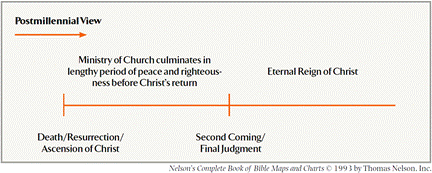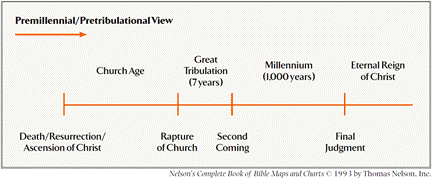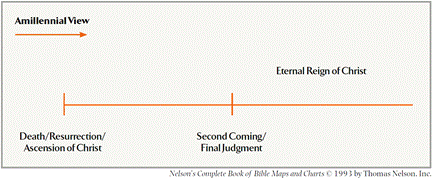By Pastor Mark Tiefel, Bethel, Morris, MN (†CLC) and Pastor Neal Radichel, Luther Memorial, Fond du Lac, WI (†CLC)
Introductory thought:
Within modern Christianity, there are a variety of beliefs about the final coming of Christ. Most of these beliefs can be narrowed down into three categories: Pre-millennialism, Post-millennialism, and A-millenialism. The term “millennialism” came about in reference to a section of Scripture that Millennialists claim speak of a thousand year reign of Christ and His Church [Revelation 20:1-6]. To help understand the teachings of Millennialism, we will examine the three main millennial beliefs in comparison to God’s Word.
What about that “1000 year reign”?
During the “thousand year reign”, Revelation 20 says Satan will be bound, and near the end he will be released for a short period. Pre-millennialism takes this literally.

A) Remember the context of Revelation – a Vision!
The book of Revelation records visions God gave to John, therefore it is figurative in many aspects. For example, in Revelation 19, John is given the picture of a sharp sword coming out of Christ’s mouth (v.15). The sword is symbolic for the Word of God [Hebrews 4:12, Ephesians 6:17]. If chapter 20 was taken literally, how could Satan, a spirit being, be bound with a physical “great chain” (v.1-2). The chain is symbolic of Christ restraining Satan with His Gospel.
The vision that John received was very much like the visions that Joseph received in the Old Testament, [Genesis 37] that were pictures representing a greater spiritual truth. Taking the thousand year reign of Revelation 20 literally, ignores the context of the book.
B) What is the significance of the number “10”?
If Revelation 20 isn’t talking about a literal thousand year reign here on earth, then what is it talking about? The answer lies in the use of the number ten, and variables of ten, in Scripture. In the Bible, the number ten is often used to picture completeness or perfection. For example, the Ten Commandments are the complete summary of God’s revealed law. Likewise, the Old Testament practice of tithing required 10% of an individual’s income. This offering represented a thanksgiving for the completeness of God’s blessings. Two passages show the number 1000 also figuratively used of completeness: Psalm 50:10 and Song of Solomon 4:4. Both books are largely figurative writings, similar to Revelation.
With this understanding, the thousand year reign of Revelation 20 is figurative of the Church’s reign through Christ. When Christ died on the cross and rose from the dead, He defeated Satan. Satan, and his work, continues to be bound this very day through the ministry and Gospel of God’s Holy Word. However, Post-millennialism has the idea that before Judgment Day, there will be a thousand year reign of peace on earth.

This view sadly contradicts that Jesus had not come to bring physical, but spiritual peace [Mt 10:34-38]. Paul likewise said, “We must through many tribulations enter the kingdom of God” [Acts 14:22]
What about “the Rapture”?
Another type of Pre-millennialism teaching is of a secret rapture of believers to heaven. The idea behind the rapture is that Christ will secretly usher in His millennial kingdom here on earth by taking believers immediately to heaven and leaving unbelievers here on earth. The teaching of the rapture also claims that once Christ’s literal thousand year reign is complete, He will come a second time to finally judge the world once and for all. To support these claims, Pre-Millennialists turn to 1 Thessalonians 4:13-18, where Paul speaks of believers being “raptured” (lifted up) to meet Christ “in the air.”

However, regarding the context of 1 Thessalonians 4 we should consider that Paul is encouraging Christians with respect to loved ones who have died already. His message is that those who have died in Christ will not miss out on His final coming. They will rise from the dead and will, together with the living, meet the Lord when He comes. What further defeats the claim of a Millennialist rapture is the fact that 1 Thessalonians 4 neither mentions a thousand year reign nor two separate comings of Christ. Rather, this section fits with what Jesus taught about the final day [Matthew 25:31-34].
What about the “two resurrections”?
Closely connected to the teaching of the Rapture is the teaching of two physical resurrections. In order to teach that believers will be taken from this earth at a different point than unbelievers, Scripture must reveal two different physical resurrections – one for believers and one for unbelievers. Revelation 20 is again used to support this idea. However, Revelation 20 only speaks of one resurrection, from v. 6: “Blessed and holy is he who has part in the first resurrection. Over such the second death has no power, but they shall be priests of God and of Christ, and shall reign with Him a thousand years.”
Although Revelation 20 doesn’t speak of two resurrections, other portions of Scripture do. In fact, the key text to understanding what is meant by the “first resurrection” in Revelation 20 comes from another one of the Apostle John’s writings, from John 5:24-29. When looking at these verses, notice how John records the words of our Savior, which clearly speak of two resurrections. The first resurrection (vv.24-25) is the awakening of a dead heart of sin (Ephesians 2:1) to a living heart of faith in Jesus. This resurrection is conversion, which is why Jesus speaks of it happening right now, in present time. The second resurrection (vv.28-29) is the physical resurrection of the dead on Judgment Day, which is why Jesus speaks of it as a future event that the second death (eternal damnation) “has no power” over the “blessed” who trust in Christ!
How shall we Respond to Millennialists?
Perhaps the greatest danger of Millennialism is how it twists the Christian’s view of God’s kingdom. By focusing on a future earthly reign of God’s Church, it takes what is spiritual by nature and turns it into something physical. The result is that it leads one to a greater attachment to the materialism of this world. This misunderstanding concerning God’s kingdom is perhaps the greatest of the Millennial dangers to our faith. Jesus warned, “Repent, for the kingdom of heaven is at hand (Matthew 4:17).” This simple message immediately taught of the spiritual nature of Christ’s work and kingdom. His reign was established by destroying the power of sin and building people up as new men and women through His forgiveness. We need not wait for these effects to kick in sometime in the future for we have them today; not physically, but spiritually by faith in our hearts. This is why Christ also stated that “the kingdom of God is within you (Luke 17:21)” and that His “kingdom is not of this world (John 18:36).”
A-millennialism literally means, “no millennium” and is a common term used for those who reject the false teachings of pre and post-millennialism. A-millennialism keeps the spiritual meaning of God’s kingdom intact, while also staying faithful to the various Scripture contexts which speak about the last days and Judgement Day.

Since the time of Christ’s ascension, we continue to live in the last days waiting for our Lord’s final return. In Acts 1:11 the angels spoke to the disciples after Jesus ascended, “Why do you stand gazing up into heaven? This same Jesus, who was taken up from you into heaven, will so come in like manner as you saw Him go into heaven.” Even so, come, Lord Jesus! Come quickly!
Other Resources
- Revelation: The Distant Triumph Song, Siegbert W. Becker
- Concordia Popular Commentary: Revelation by Louis A. Brighton
- People’s Bible Commentary on Revelation by Wayne D. Mueller